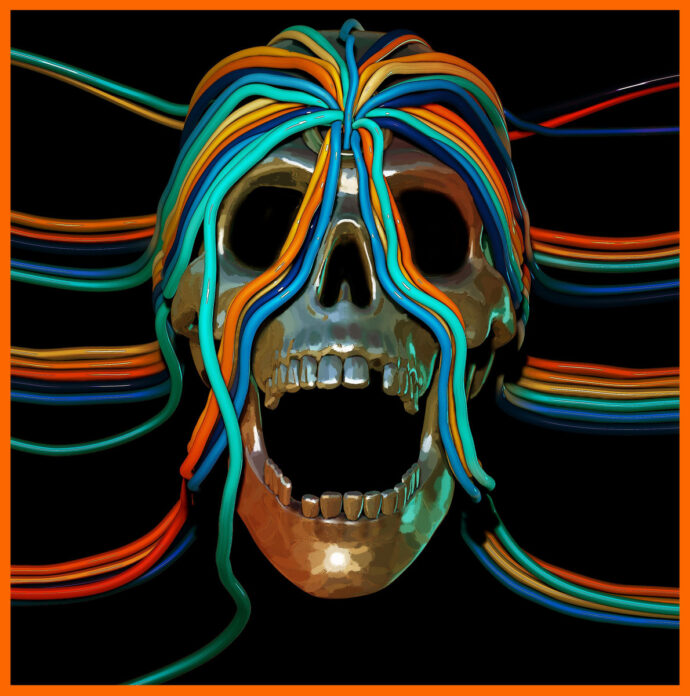If last year’s A Foul Form was Osees’ tribute to the primitive scum punk of the 70s and 80s, their latest full-length, Intercepted Message, is a celebration of the synthy, new wave art-punk that sprang forth from those same decades. Frontman John Dwyer’s project’s latest incarnation is made up of the same five members who played on every LP the band has released since 2019’s Face Stabber. As such, the group sounds incredibly tight and agile, perfect for the task of infusing this collection with their signature psychedelic prog-punk weirdness.
Osees waste no time trying to disguise their intentions. Within seconds of the album’s opener, “Stunner”, a prominent, colorful analogue synth creates a call-and-response to Dwyer’s guitar, and the dual drum attack of Dan Rincon and Paul Quattrone work incredibly well to thicken the song’s danceable rhythm. Most songs on Intercepted Message find Dwyer employing a retro, new wavey vocal affectation complete with “oh, oh, ohs” tacked onto the end of his phrases. Still, with his trademark yelps and yips sprinkled throughout, we never forget we’re listening to an Osees album. “Die Laughing” takes the record into disco terrain. Unpredictably squelchy, bubbly electronics, a spastic guitar, and Dwyer’s heavily reverbed vocals help mutate and enliven the track’s otherwise retro inclinations. Side A of the record is concluded with a cover of British jazz punk oddballs Blurt’s 1981 song “The Fish Needs a Bike”. While the tribute is well-intended, the song’s monotonous pattern, and title repeated ad nauseum, make the track an awkward fit in the sequence.
The comparatively short, perky “Goon” kicks off the album’s second half. It’s a decent number with a memorable chorus that has Dwyer singing, “A goon in the daytime, a goon in the night, oh what am I doing, I’m doing alright.” The next three songs find Osees stretching their legs a bit. “Chaos Heart” pulls things back tempo-wise and, with a Mini-Korg weaving through, sounds like it could almost be a lost B-side from The Cars’ 1978 debut. “Submerged Building” puts Tim Hellman’s bass and the band’s twin drummers front and center, giving the song a Remain in Light-era Talking Heads feel, and the trifecta is ended with “Sleazoid Psycho” that, with its quirky chord changes, is reminiscent of Devo.
“Always at Night” is Intercepted Message’s last actual song (the record’s twelfth track is “Opus No. 1”, better known as the mind-numbing corporate hold music anyone phoning an office has had to endure for the last thirty years). Although it’s an anomaly after everything that’s preceded it, “Always at Night” is undoubtedly the album’s finest moment. Dwyer’s slow, sad croon here is devastatingly beautiful, and his lyrics are equally stunning. “Your heart has shattered, like a glass menagerie, tears in your eyes, so you cannot speak,” Dwyer sings lovingly before literally and figuratively invoking the spirit of 1983. The irksome moments on Intercepted Message are few. Osees’ twenty-seventh studio album is a largely decent collection of songs, one that any fan of John Dwyer and the bands and artists who came to be associated with 70s and 80s new wave will enjoy.
Rating: 7.6/10

